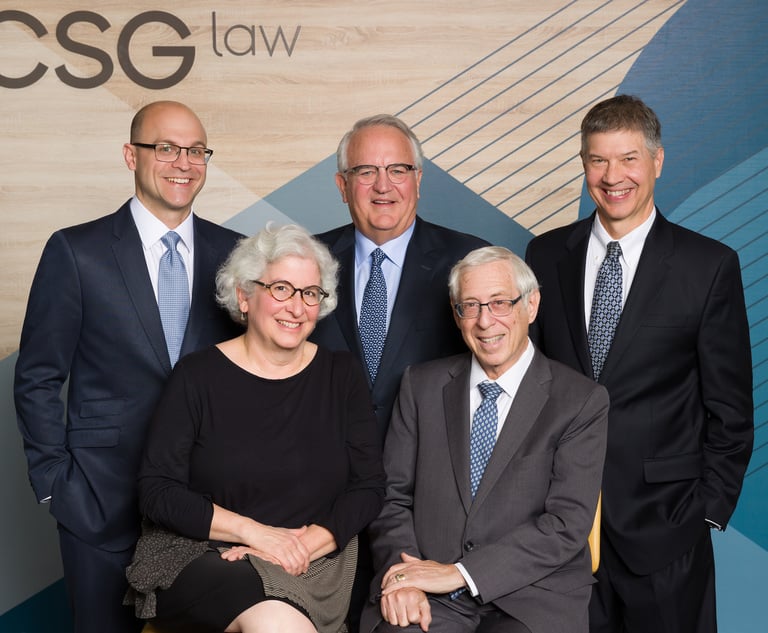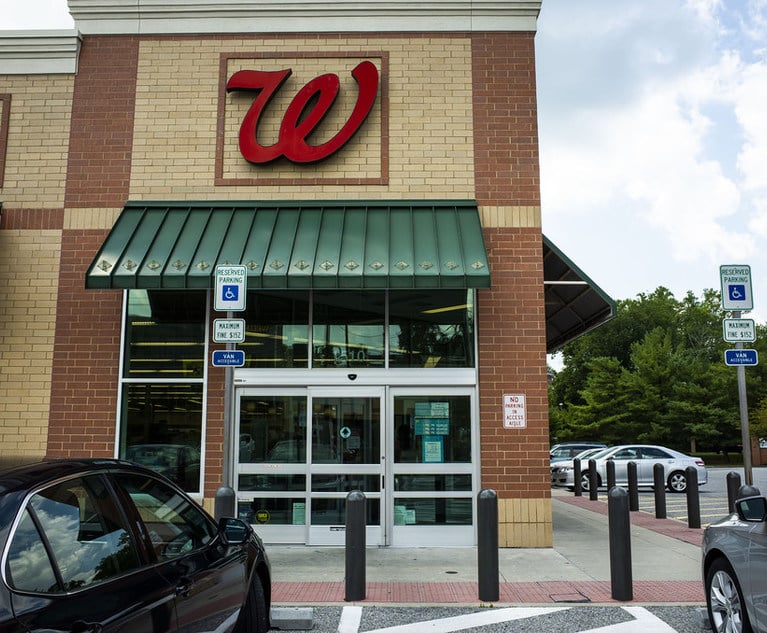 Bluestocking/iStockphoto
Bluestocking/iStockphotoNJ Environmental Law's Top 10 of 2019
The New Jersey Department of Environmental Protection is almost 50 years old.
November 01, 2019 at 12:00 PM
7 minute read
During 2019 the Murphy administration's environmental agenda took shape and sharper focus. As expected, it has followed a much greener path than the business-friendly or open for business climate defined by the Christie/Martin tenure.
The executive branch efforts were complemented by legislative initiatives many of which had languished on Sen. Bob Smith's (D-Middlesex), chair of the Senate's Environment and Energy Committee, to do list. A number of significant judicial decisions and executive branch actions rounded out 2019's top ten.
|10. Highlands Exemption Decision
In N.J. Highlands Coalition v. DEP, the Supreme Court considered whether a Highlands Act exemption for an affordable housing project had expired because construction beyond site preparation had not commenced within three years of all final approvals pursuant to the Municipal Land Use Law (MLUL). N.J.S.A. 13:20-28(a)(17). 236 N.J. 208 (2018). See L. Goldshore, "Watch on the Highlands: Recent Events," 225 N.J.L.J. 47 (Jan. 7, 2019).
The court agreed with the appellate ruling that this very limited exemption had not lapsed. It distinguished the term final approval as used in the MLUL from all final approvals as used in the Highlands Act. It remains an open question whether the result reflected the legislature's actual intent or was simply a product of imprecise drafting.
|9. Spill Fund Claim Denial Reversed
On July 29, the Supreme Court decided US Masters Residential Property v. DEP, a case that concerned entitlement to reimbursement from the Spill Fund, established by the Spill Compensation and Control Act. N.J.S.A. 58:10-23.11 et seq. ___ N.J. ____ (2019). The Appellate Division upheld an arbitrator's denial of the claim because the claimant failed to establish a post-Spill Act—after April 1, 1977—discharge of hazardous substances on its properties. But that ruling was reversed and remanded for a new administrative hearing based on "flaws in the substantive reasoning of the arbitration decision as well as procedural fairness considerations [that] undermine confidence in the outcome." For additional discussion of this decision, see L. Goldshore, "Spill Fund Claim Denial Reversed," 225 N.J.L.J. 2215 (Aug. 19, 2019).
|8. High-Rise Construction on Hudson River Pier
The Supreme Court has agreed to hear the latest case in a long running battle concerning the proposed construction of two high-rises on a Hudson River pier. Shipyard Associates, L.P. v. City of Hoboken, 2019 WL 149532 (App. Div.), certif. granted, 238 N.J. 377 (2019). Previously, the Appellate Division held that the developer had obtained automatic approval of the preliminary and final subdivision due to the planning board's unlawful refusal to hear the application.
The current matter concerned zoning and flood control ordinances that the city adopted to prohibit the proposed construction. The appeals court found that the municipality had attempted to retroactively apply ordinances that would completely change the permitted uses and result in the revocation of a previously-granted final approval, contrary to the MLUL's plain wording. N.J.S.A. 40:55D-52(a).
|7. Environmental Enforcement Returns
Last year, the attorney general announced that the state was "back in the environmental enforcement business." That dramatic change in approach was reflected in the filing of six cost recovery actions, three of which included natural resource damage (NRD) claims. That initial step was followed by the filing of six environmental justice lawsuits last December, as well as by other environmental litigation in coordination with the Department of Environmental Protection (DEP).
Stepped up enforcement activity continued this year with the filing of a complaint against ExxonMobil that demanded the cleanup of a Gloucester County site, as well as natural resource damages. Other notable enforcement initiatives were focused on the manufacturers of per- and polyfluoroalkyl substances (PFAS) and on the manufacturers and vendors of aqueous film-forming foam which has been linked to the release of PFOS and PFOA [PFAS chemicals] into the environment. Additionally, New Jersey joined other states in several lawsuits in the federal courts challenging USEPA's and other federal actions and inactions.
|6. PFAS in the Crosshairs
DEP's efforts to address PFAS contamination can be traced through a number of press releases and regulatory initiatives:
- Feb. 14: Criticized USEPA for dragging its heels concerning the adoption of a federal maximum contaminant level for PFAS;
- Mar. 25: Issued a statewide directive to five companies that alleged that they were responsible for significant PFAS contamination and for DEP's past and future costs;
- Apr. 1: Proposed health-based drinking water standards for PFOA and PFOS; and
- July 24: DEP commissioner testified before a congressional subcommittee concerning the state's efforts and the lack of progress at the federal level.
5. Stormwater Utilities Authorized
On Mar. 18, Gov. Murphy approved the Clean Stormwater and Flood Reduction Act (CSFRA) to enable counties and municipalities to establish stormwater utilities. N.J.S.A. 40A:26B-1 et seq. This resulted in New Jersey joining 40 other states that have authorized the creation of stormwater utilities.
These entities are responsible for addressing nonpoint sources (NPS) of water pollution and imposing fees on the sources of stormwater runoff. Managing NPS tends to be exceedingly costly—according to one estimate this is a $16 billion problem. As a result, remedial efforts will need to be implemented over decades and on an incremental basis. See L. Goldshore, "Get Ready for Stormwater Utilities," 225 N.J.L.J. 523 (Feb. 25, 2019).
|4. Public Trust Doctrine Codified
On May 3, Gov. Murphy approved legislation that codified the public trust doctrine, a common-law principle recognized nearly 200 years ago in Arnold v. Mundy. 6 N.J.L. 1, 71 (1821). That case assigned "the air, the running water, the sea, the fish, and the wild beasts" to a special class of public property that would "remain common to all the citizens, who take of them and use them, each according to his necessities, and according to the laws which regulate their use."
The modern application of the public trust doctrine arose in connection with the beach access/beach fee litigation. The new law expressly directed DEP to utilize the public trust doctrine and statutory law "to protect the public's right of access to tidally flowed waters and their adjacent shores." See L. Goldshore, "Public Trust Doctrine Legislation," 225 N.J.L.J. 1198 (May 13, 2019). The drafting of implementing regulations to address the competing interests will be a difficult undertaking.
|3. Regulatory Review
Keeping track of DEP's proposed administrative rules has become easier. Interested parties can subscribe to the agency's LISTERV and receive advance notice of the proposals by email. https://www.nj.gov/dep/rules/subscribe.html.
One noteworthy proposal this year would amend the surface water quality standards and reclassify 749 additional miles of rivers and streams as Category One (C-1) waterways. This is very significant from a development perspective because the Flood Hazard Area Control Act requires that a 300-foot development buffer be provided and any discharges impacting on C-1 waterways are required to comply with stringent water quality standards.
|2. Relationship With the Environmental Community
From the onset, there has been tension in the relationship between the organized environmental community and DEP. The differences are reduced but not eliminated when, as now, the governor and the commissioner are committed to environmental protection measures.
But environmentalists tend to be uncomfortable with compromises and efforts to strike a balance among competing societal interests. They have generally overstated their positions which, in the long term, may have undercut their effectiveness in achieving their desired objectives.
|1. Closing in on 50 Years
DEP will turn 50 on April 22, 2020. For most of that period, New Jersey has been recognized as a national leader in efforts to protect the air, water and land from pollution. Those efforts, while admirable, pale in comparison with the measures that will be required to meet the current environmental challenges including climate change, rising sea levels and the loss of biodiversity.
Lewis Goldshore practices in Princeton. His practice is devoted to environmental, land use and municipal law. He is the author of New Jersey Environmental Law (ICLE 2010).
This content has been archived. It is available through our partners, LexisNexis® and Bloomberg Law.
To view this content, please continue to their sites.
Not a Lexis Subscriber?
Subscribe Now
Not a Bloomberg Law Subscriber?
Subscribe Now
NOT FOR REPRINT
© 2024 ALM Global, LLC, All Rights Reserved. Request academic re-use from www.copyright.com. All other uses, submit a request to [email protected]. For more information visit Asset & Logo Licensing.
You Might Like
View All
Appellate Div. Follows Fed Reasoning on Recusal for Legislator-Turned-Judge
4 minute read
Chiesa Shahinian Bolsters Corporate Practice With 5 From Newark Boutique
5 minute read
'A Mockery' of Deposition Rules: Walgreens Wins Sanctions Dispute Over Corporate Witness Allegedly Unfamiliar With Company
Trending Stories
Who Got The Work
Michael G. Bongiorno, Andrew Scott Dulberg and Elizabeth E. Driscoll from Wilmer Cutler Pickering Hale and Dorr have stepped in to represent Symbotic Inc., an A.I.-enabled technology platform that focuses on increasing supply chain efficiency, and other defendants in a pending shareholder derivative lawsuit. The case, filed Oct. 2 in Massachusetts District Court by the Brown Law Firm on behalf of Stephen Austen, accuses certain officers and directors of misleading investors in regard to Symbotic's potential for margin growth by failing to disclose that the company was not equipped to timely deploy its systems or manage expenses through project delays. The case, assigned to U.S. District Judge Nathaniel M. Gorton, is 1:24-cv-12522, Austen v. Cohen et al.
Who Got The Work
Edmund Polubinski and Marie Killmond of Davis Polk & Wardwell have entered appearances for data platform software development company MongoDB and other defendants in a pending shareholder derivative lawsuit. The action, filed Oct. 7 in New York Southern District Court by the Brown Law Firm, accuses the company's directors and/or officers of falsely expressing confidence in the company’s restructuring of its sales incentive plan and downplaying the severity of decreases in its upfront commitments. The case is 1:24-cv-07594, Roy v. Ittycheria et al.
Who Got The Work
Amy O. Bruchs and Kurt F. Ellison of Michael Best & Friedrich have entered appearances for Epic Systems Corp. in a pending employment discrimination lawsuit. The suit was filed Sept. 7 in Wisconsin Western District Court by Levine Eisberner LLC and Siri & Glimstad on behalf of a project manager who claims that he was wrongfully terminated after applying for a religious exemption to the defendant's COVID-19 vaccine mandate. The case, assigned to U.S. Magistrate Judge Anita Marie Boor, is 3:24-cv-00630, Secker, Nathan v. Epic Systems Corporation.
Who Got The Work
David X. Sullivan, Thomas J. Finn and Gregory A. Hall from McCarter & English have entered appearances for Sunrun Installation Services in a pending civil rights lawsuit. The complaint was filed Sept. 4 in Connecticut District Court by attorney Robert M. Berke on behalf of former employee George Edward Steins, who was arrested and charged with employing an unregistered home improvement salesperson. The complaint alleges that had Sunrun informed the Connecticut Department of Consumer Protection that the plaintiff's employment had ended in 2017 and that he no longer held Sunrun's home improvement contractor license, he would not have been hit with charges, which were dismissed in May 2024. The case, assigned to U.S. District Judge Jeffrey A. Meyer, is 3:24-cv-01423, Steins v. Sunrun, Inc. et al.
Who Got The Work
Greenberg Traurig shareholder Joshua L. Raskin has entered an appearance for boohoo.com UK Ltd. in a pending patent infringement lawsuit. The suit, filed Sept. 3 in Texas Eastern District Court by Rozier Hardt McDonough on behalf of Alto Dynamics, asserts five patents related to an online shopping platform. The case, assigned to U.S. District Judge Rodney Gilstrap, is 2:24-cv-00719, Alto Dynamics, LLC v. boohoo.com UK Limited.
Featured Firms
Law Offices of Gary Martin Hays & Associates, P.C.
(470) 294-1674
Law Offices of Mark E. Salomone
(857) 444-6468
Smith & Hassler
(713) 739-1250







